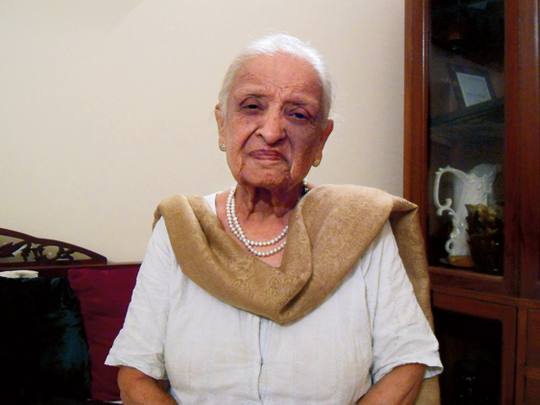
My most cherished memory goes back to my childhood home.
I was born in 1930 in Hyderabad, India. I lived with my parents, maternal grandparents and ten siblings [I was the eldest]. Family values - honesty, hospitality, humility and morality, to name but a few - were upheld at all times. We had a dining table that could seat 46 guests at a time. Every visitor was treated with equal yet enormous reverence and honour. No matter what the time of day or night, no one would leave our house unattended.
My parents and maternal grandparents were my guiding light.
My father was a successful businessman. My mother, originally from Uttar Pradesh, was a homemaker. I owe a lot to my maternal grandfather, Syed Nisar Ahmad, a highly respected civil servant and a renowned poet. In light of his lifelong services, he was conferred with the title Nawab Nisar Yar Jung Bahadur by the then Hyderabad ruler, Mir Usman Ali Khan.
I did not attend a formal school but I was given a sound education at home.
My home was the perfect place for me to spend my childhood; we were not very rich in monetary terms but we were wealthy in our abundance of knowledge, our love of poetry and the talent we had within our family.
As a result of the conservative nature of our society at the time, my female siblings and I were not sent to a formal school but were given the very best education at home. We had a tutor for every subject which included art, mathematics, Urdu, Arabic, science, physics, history and geography. We subscribed to newspapers and magazines from all over India and Europe which we could study and learn from.
I wrote my first novel at the age of 14.
It is titled Muslim samaj and I still have a copy of it. I was strongly influenced by the ideology of communism and wished for a classless society. It is this dream that forms the premise of this book. My maternal grandfather liked my work so much that he spent a considerable amount of money to get it published. Dignitaries from all over India, including professor Rasheed Ahmad Siddiqui, a distinguished writer and professor from Aligarh University; Maulana Abdul Majid Daryabadi, who was also the chief editor of the political newspaper Sidq; renowned poet Jigar Muradabadi and Maulana Mahirul Qadri were amongst those who contributed towards the preface of the book.
I remember the overwhelming response that poured in - letters, cards and notes from all over India - to congratulate me on the success of the novel. It was a very proud moment for me. After that, I remained a regular contributor to numerous publications, newspapers and magazines in Hyderabad. Today, my library holds a collection of 30,000 books, magazines, novels, short stories and poems I either wrote or collected over the years; they are my most prized possessions.
The first few years after the partition of the subcontinent were turbulent.
Sometime in 1948, my family and close friends - escorted by Indian soldiers - travelled from Hyderabad to Bombay by train and eventually reached Karachi.
We went through some tough times around that time as I lost my father and my maternal grandfather, leaving no patriarch in the family. I went in search of employment and since I was creative, I took up a job at the Gul-e-Rana Club, a prestigious arts and craft learning centre based in Karachi.
Following a ten-year hiatus from writing, I wrote my first TV series in 1964.
The early 1960s saw a new wave of communication as the television was introduced in Pakistan. In 1964, I was asked to write for a TV series by the information secretary at the time, Altaf Gauhar. At his insistence, I dramatised the Bagh-o-Bahar, originally written in Persian by veteran Amir Khusro which was later translated into Urdu. I dramatised around 96 novels, scripts and plays over the next two years.
A lot of scripting work came my way in terms of TV serials, documentaries, plays, musicals and children's stage shows. Agahee, Ana, Afshan, Zeeshan, Babar', Aroosa, Shama and Ghar ek Nagar were some of the most popular television shows. I am currently working on the dramatised adaptation of a 150-year-old novel Anwar and a television series will be aired soon.
Receiving accolades and awards made me a more humble a person.
My most cherished memory goes back to receiving the Pride of Performance Award, one of the most prestigious civilian honours in Pakistan. I was later conferred with Japan's civilian honour as well. Numerous other awards and honours came my way, each making me realise how blessed I was to receive the affection and appreciation of people who enjoyed my work.
I admire today's generation.
Our children are far better human beings than children of my generation and the generations before me; they are more humble, sensitive and far more socially aware.
They are willing to forget deep-rooted prejudices by transcending borders and creating new alliances and friendships with others. It's commendable to watch them bridge gaps through art, music and media. We can trust the fate of our nations in their competent hands.











